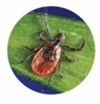Powassan virus disease

Powassan virus disease is spread to people through the bite of an infected Black-legged (“deer”) tick (Ixodes scapularis). This is a rare, emerging infection in the United States and human cases have been identified in Connecticut. The virus can cause severe disease. There is no vaccine to prevent or medicine to treat Powassan virus infection. The best way to prevent Powassan virus disease is to prevent tick bites.
Information for Clinicians
Clinical Guidance (CDC)
National Surveillance Case Definitions
Connecticut Provider Reporting Information
Connecticut Laboratory Reporting Information
Powassan virus testing at the State Public Health Laboratory
State Public Health Laboratory Contacts – for additional information
Tick-borne Diseases of the United States – a Reference Manual for Healthcare Providers
Connecticut Powassan virus disease Surveillance
The Connecticut Department of Public Health (DPH) added Powassan virus disease to the list of state-wide reportable diseases in 2019. DPH uses the Centers for Disease Control and Prevention surveillance case definition, which was established in 2005. Surveillance will help characterize the epidemiology, clinical spectrum, and incidence of Powassan virus disease in Connecticut, and will assist with the national description of the diseases.
Connecticut Annual Infectious Diseases Statistics
This page last updated 11/9/2022.

